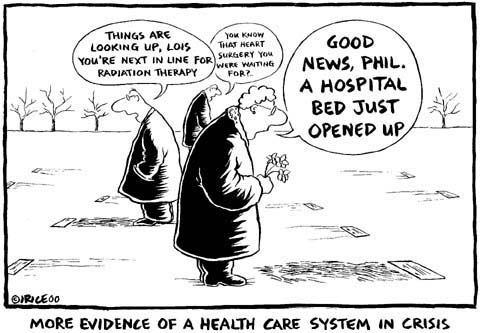Newsweek’s Ms. Begley’s Five Health Care Lies

DID YOU read the one that shouts, via a chain email, that under the proposed health care reform, the Federal Government will have electronic access to everyone’s bank account? Like the strident assertion about “pulling the plug on Granny”, this is scary stuff. You both get robbed blind and lose a relative!
Of course, it’ not true. In fact, technically speaking, those that profess that this is true are lying, which makes the grandma thing and the electronic account thing…well, lies.
That’s not to say that there’s nothing worth debating in any of the various proposed bills with which our legislators wrestle. For instance, it would be mighty fine to get some clarity about cost savings, efficiencies and policies that promote individual responsibility.
But to lie in order to spin things your way is wrong. Such people need to be tarred and feathered.
In her piece in the September 7, 2009 Newsweek Magazine, Sharon Begley writes The Five Biggest Lies in the Health Care Debate, about which I here summarize and comment upon. (But for the delight of reading a well-written piece and absorbing more information, do read her article at the link above.)
Ms. Begley’s five are different than health care journalist R.J Reid’s five, and Begley titles them “lies” before listing them as “myths” in the body of her article, whereas Reid stays with the myth terminology all the way through.
I tend to think of myths as lies on Viagra — they just keep popping up and won’t go away, which, if you’re lucky, a lie will eventually do. (Go away.) Nonetheless, whether lies or myths, here’s what Sharon Begley reports:
#1. It’s a lie that there’s no choice in what health benefits you receive.
The House bill sets up a health care exchange—essentially a list of private insurers and one government plan—where people who do not have health insurance through their employer or some other source can shop for a plan, much as seniors shop for a drug plan under Medicare part D. The government will require that participating plans not refuse people with preexisting health problems. The requirements will be floors, not ceilings, however, in that the Feds will have no say in how generous private insurance can be.
Take away: You can have your cake and eat it too.
#2. It’s a lie that no chemo would be available for older Medicare patients.
The House bill does not use the word “ration.” Nor does it call for cost-effectiveness research, much less implementation—the idea that “it isn’t cost-effective to give a 90-year-old a hip replacement.”
A related myth is that health care reform will be financed through $500 billion in Medicare cuts. No, actually what is proposed in the House bill is that the rate of increase in Medicare would be reduced because of various savings garnered from the new legislation, which would also give Medicare $340 billion more over a decade.
Take away: The intent is to make Medicare more efficient, not “pull the plug on Granny”.
#3. It’s a lie that illegal immigrants will get free health insurance.
The House bill doesn’t give anyone free health care (though under a 1986 law “illegals” who can’t pay do get free emergency care now, courtesy of all us premium paying customers or of hospitals that have to eat the cost). Will they be eligible for subsidies to buy health insurance? The House bill says that “individuals who are not lawfully present in the United States” will not be allowed to receive subsidies.
Take away: Nothing changes with how illegal immigrants get health care.
#4. It’s a lie that death panels will decide who lives.
This lie springs from a provision in the House bill to have Medicare cover optional counseling on end-of-life care for any senior who requests it. This means that any patient, terminally ill or not, can request but are not obligated to have a special consultation with his or her physician about ventilators, feeding tubes, and other measures. The House bill expands Medicare coverage, but without forcing anyone into end-of-life counseling.
Take away: If you choose to talk to a professional about end-of-life issues, you can and it’s paid for.
#5 It’s a lie that the government will set doctors’ wages.
It is true that the House bill says that physicians who choose to accept patients in the public insurance plan would receive five percent more than Medicare pays for a given service — thus setting a “wage” — but doctors can refuse to accept such patients, and, even if they participate in a public plan, they are not salaried employees of it.
Take away: Doctors maintain their free will over how to operate their business.
So, thus ends the five myths, or lies, or just plain old misunderstandings of the proposed health care legislation. If you’re scratching your head about how and why such… err… inaccuracies promulgate, read Ms. Begley’s article.
And for a more psychological approach to understanding mythmaking, stay tuned for an upcoming post on “cognitive dissonance”, or “Why I Don’t Wanna Know What I Don’t Wanna Know”, or some such title.
Last Updated on June 10, 2020 by Joe Garma


